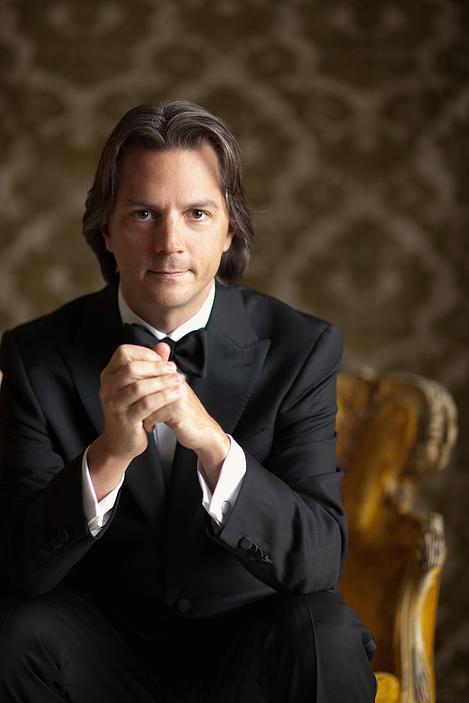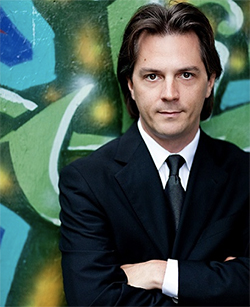by Jarrett Hoffman

That’s what conductor Daniel Meyer told me over the phone in early April after I asked him about further engagements with BlueWater Chamber Orchestra in the seasons to come.
And I can only assume that he was winking when he said it. Less than two weeks later, on April 22, Meyer was announced as the ensemble’s new Artistic Director and Conductor, succeeding founder Carlton Woods, who passed away in 2017.
He will lead his first concert as Music Director on Saturday, May 4 at 7:30 pm at Plymouth Church in Shaker Heights (more on that program in a bit). He already knows the players well, having appeared as guest conductor with BlueWater several times over the past few seasons.
And he seems to genuinely love the orchestra. “I took to them right away,” he told me. “We make a lot of progress in a very short amount of time, and part of that is of course due to their expertise. To my mind, they are really an all-star team, and it’s just an enormously gratifying experience for me to work with them.”
This isn’t Meyer’s first post in the region. He also serves as Music Director of the Erie Philharmonic and Lakeside Symphony Orchestra, Artistic Director of the Westmoreland Symphony, and Director of Orchestral Activities at Duquesne University.
Before all that, he was raised in Medina County and graduated from Padua Franciscan High School, Denison University, and the University of Cincinnati College-Conservatory of Music. He also studied conducting at the Hochschule für Musik in Vienna as a Rotary Ambassadorial Scholar.
That’s a lot of rust belt in his background. During an interview in 2017, he called the people of the area warm-hearted, friendly, and caring. “Yet there is a little bit of a grit and toughness,” he said, “and I think it has to do with the gray days and the industrial history of these cities. There’s this real work ethic that comes with living around here.”
In his mind, that helps explain the quality of the orchestras in Cleveland, Erie, Pittsburgh, and Buffalo. “These are communities that have believed in their musical institutions and supported them. And the musicians make them their focus: they’re not distracted, they really believe that this is their life’s work and want to give their best every time they take the stage.”
On a lighter note, we briefly talked sports. “I learned to deal with disappointment at a very early age with the Cleveland Browns and the Indians,” he said in that interview. “It was a real shock to move to Pittsburgh, where you’d watch television and hear the sports shows. The way they talked, you would think the team had just lost — but they had actually won, and they were making a march to the Super Bowl.”
Fast forward to the present, where we find an atmosphere of excitement around the Browns’ prospects next season, and also around this new music director in town. “Daniel is the creative leader we’ve been looking for,” BlueWater concertmaster Ken Johnston said in a press release.

Asked if those stories have impacted his interpretation, Meyer said that for him, it’s more about the sound world that each composer created in response to the stories. “It really comes down to the colors and scenes,” he said. “These are rather painterly pieces, particularly the Ravel.”
What’s strange about the ballet version of Mother Goose is that it actually came after the more famous Suite. “Usually you take a ballet and distill it into its greatest hits,” Meyer said. “But in this case he’s taking this exquisite Suite and brilliantly stitching the elements together to make it sound as if it started as a ballet. I just love that it’s a bit of a role reversal — I think that’s fascinating.”
David Diamond’s take on Romeo and Juliet isn’t the first, nor the most famous by a classical composer. What sets it apart from the rest, Meyer said, is Diamond’s American voice.
“It has this brash quality to it, and there’s a bit of a naiveté which I think is intentional. It’s supposed to sound like music about teenagers who are either battling each other or falling in love.”
The conductor noted that Diamond was part of a generation of American composers who wrote tonal music at a time when it wasn’t fashionable. “If you wanted to be taken seriously, you should not have been writing music that was immediately understandable and digestible by an audience,” he said.
Meyer feels that Corigliano was also born out of that tradition. He mentioned Corigliano’s kinship with Samuel Barber. “Now these composers are sitting pretty in terms of how they’re regarded,” he said. “Their music is continuing to be performed, while a lot of the serialists are kind of being left in the dust.”
Elgar’s Serenade for Strings is an outlier in terms of theme: it doesn’t have roots in any story. To Meyer, there’s something about this piece that makes him think of the composer — who was also a violinist — playing it with his friends. “There’s a bit of nostalgia, a friendliness, and an approachability to the music,” he said. “It has an easygoing nature — it never gets too over-boiled or angry — and it’s all done with a deft and gentle touch. In part that was his personality, but I also think it was an intentional move to say, let’s sit down and make some music together.”
Published on ClevelandClassical.com April 29, 2019.
Click here for a printable copy of this article



